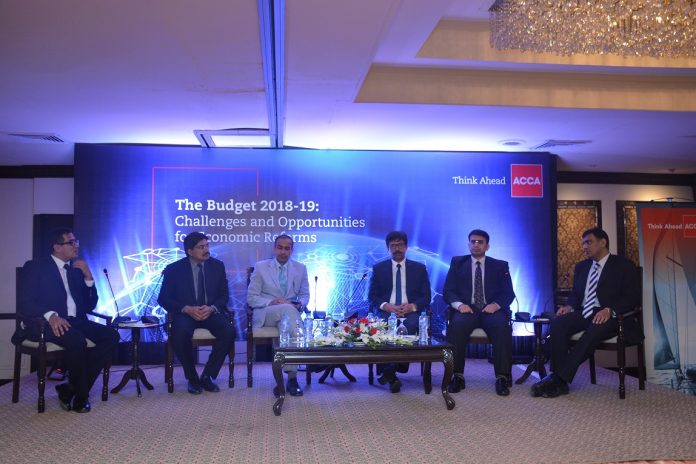LAHORE: ACCA Pakistan hosted an expert discussion on “The Budget 2018–19: Challenges and Opportunities for Economic Reforms” which was aimed at keeping professionals up-to-date with the relevant changes that were being made to the Finance Act through the federal budget 2018–19.
This event was an opportunity to deliberate upon the recent federal budget, the opportunities created and challenges posed by it for the ongoing economic reforms in Pakistan. The forum also raised a common voice of all tax experts of Pakistan to share their feedback with Federal Board of Revenue (FBR) and other tax regulators. The panellists included EY Partner Taxation and ICAP Council Member Muhammad Awais, Aamir Ijaz Khan, ICMAP Executive Director Omer Zaheer Meer, ACCA Pakistan Taxation Committee Chairman Kamal Mian, and LCCI Standing Committee on Policy Advocacy Chairman Monim Sultan. The panellists analysed the budget in light of the global standards of fair taxation, its impact on broadening the tax base, ease of doing business and global competitiveness indices and China Pakistan Economic Corridor (CPEC).
In the welcome address that was delivered by ACCA Pakistan Head Sajjeed Aslam – he reiterated that the purpose of this session is to achieve the milestones of emerging Pakistan which had been identified by ACCA as
- 7 per cent plus GDP growth rate (next five years average)
- ranking in top 50 for ease of doing business; and
- ranking in top 50 for global competitiveness indices (GCI)
He conveyed that ACCA pledged to create such capacity, competency and talent within the society that will not only provide support for the economic growth of the country but also assist in upholding the trust level of the society.
He identified this to be the primary and key role for any accountancy body including ACCA, ICAP, ICMAP and ICAEW and also highlighted that the CPEC is not only about the opportunities but it has allied challenges as well. He elaborated on the 12 tenets of fair taxation in detail which were identified by ACCA through its global research base and represented in the rest of the world through ACCA’s global tax forum.
EY Partner Taxation and ICAP Council Member Muhammad Awais delivered the keynote address. He conveyed that some of the changes that were proposed through this budget in reference to the indirect taxation system under the sales tax law or the customs law have now been implemented through notification with immediate effect, however, rest of the budget announcements will be implemented with effect from July 1, 2018.
He suggested that our focus needs to be aligned with the taxation system in the other part of the world and must be primarily based on the direct taxes instead of indirect taxes. Currently, direct taxes account for 37 per cent and indirect taxes account for 67 per cent of the total tax revenue collection.
He also highlighted that the filer tax regime promotes the indirect taxation system and until the elimination of the filer regime system, the burden from indirect taxation cannot be shifted to direct tax and income based taxation system.
LCCI Standing Committee on Policy Advocacy Chairman Kamal Mian highlighted that the most difficult thing to do in Pakistan is manufacturing. He endorsed the vision of ACCA for ease of doing business and emphasised upon the simplicity for ease of doing business.




